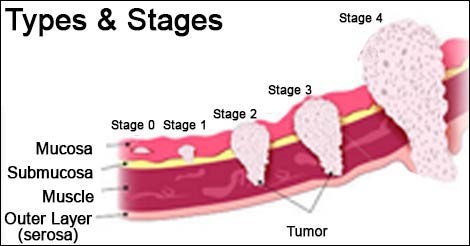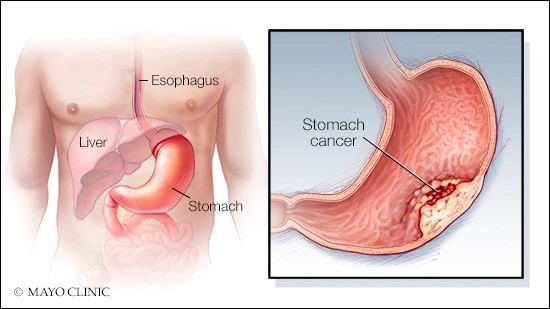Stomach cancer is a disease in which cancer cells form in the lining of the stomach. These cells can grow into a tumor. Also called gastric cancer, the disease usually grows slowly over many years.
The stomach is located in the upper abdomen and plays a central role in digesting food. When food is swallowed, it is pushed down the muscular tube called the esophagus, which connects the throat with the stomach. Then, the food enters the stomach. The stomach mixes the food and releases gastric juices that help break down and digest the food. The food then moves into the small intestine for further digestion.
Stomach cancer begins when healthy cells in the stomach become abnormal and grow out of control. A tumor can be cancerous or benign. A cancerous tumor is deadly, meaning it can grow and spread to other parts of the body. A benign tumor means the tumor can grow but will not spread. Cancer can begin in any part of the stomach. It can also spread to nearby lymph nodes and other parts of the body, such as the liver, bones, lungs, and a woman’s ovaries.
Most stomach cancers are a type called adenocarcinoma. This means that the cancer started in the glandular tissue that lines the inside of the stomach. Other types of cancerous tumors that form in the stomach include lymphoma, gastric sarcoma, and carcinoid tumors, but these are rare.
Scientists don’t know exactly what makes cancer cells start growing in the stomach. But they do know a few things that can raise your risk for the disease. One of them is infection with a common bacteria, H. pylori, which causes ulcers. Inflammation in your gut called gastritis, a certain type of long-lasting anemia called pernicious anemia, and growths in your stomach called polyps can also make you more likely to get cancer.
People with stomach cancer may experience the following symptoms or signs. Sometimes, people with stomach cancer don’t have any of these changes. Stomach cancer is usually not found at an early stage because it often doesn’t cause specific symptoms. When symptoms occur, they may be vague and can include those listed below:
- Indigestion or heartburn
- Pain or discomfort in the abdomen
- Nausea and vomiting, particularly vomiting up solid food shortly after eating
- Diarrhea or constipation
- Bloating of the stomach after meals
- Loss of appetite
- Sensation of food getting stuck in the throat while eating
- Symptoms of advanced stomach cancer may include:
- Weakness and fatigue
- Vomiting blood or having blood in the stool
- Unexplained weight loss
It’s important to remember that these symptoms can also be caused by many other illnesses, such as a stomach virus or an ulcer.
To find out if you have stomach cancer, your doctor starts with a physical exam. He’ll also ask about your medical history to see if you have any risk factors for stomach cancer or any family members who’ve had it. Then, he might give you some tests, including:
- Blood tests to look for signs of cancer in your body.
- Upper endoscopy. Your doctor will put a thin, flexible tube with a small camera down your throat to look into your stomach.
- Upper GI series test. You’ll drink a chalky liquid with a substance called barium. The fluid coats your stomach and makes it show up more clearly on X-rays.
- CT scan. This is a powerful X-ray that makes detailed pictures of the inside of your body.
- Biopsy. Your doctor takes a small piece of tissue from your stomach to look at under a microscope for signs of cancer cells. He might do this during an endoscopy.
- Magnetic resonance imaging (MRI). An MRI uses magnetic fields, not x-rays, to produce detailed images of the body. MRI can be used to measure the tumor’s size. A special dye called a contrast medium is given before the scan to create a clearer picture. This dye is usually injected into a patient’s vein.
After diagnostic tests are done, your doctor will review all the results with you. If the diagnosis is cancer, these results also help the doctor describe the cancer. This is called staging.
Staging is a way of describing where the cancer is located, if or where it has spread, and whether it’s affecting other parts of the body. There are 5 stages: stage 0 (zero) and stages I through IV (1 through 4). The stage provides a common way of describing the cancer, so doctors can work together to plan the best treatments.
Many treatments can fight stomach cancer. The one you and your doctor choose will depend on the stage of your cancer:
- Stage 0. This is when the inside lining of your stomach has a group of unhealthy cells that may turn into cancer. Surgery usually cures it. Your doctor may remove part or all your stomach, as well as nearby lymph nodes (small organs that are part of your body’s germ-fighting system).
- Stage I. At this point, you have a tumor in your stomach’s lining, and it may have spread into your lymph nodes. As with stage 0, you’ll likely have surgery to remove part or all your stomach and nearby lymph nodes. You might also get chemotherapy or chemoradiation. These treatments can be used before surgery to shrink the tumor and afterward to kill any cancer that’s left. Chemotherapy uses drugs to attack cancer cells. Chemoradiation is chemo plus radiation therapy, which destroys cancer cells with beams of high energy.
- Stage II. Cancer has spread into deeper layers of the stomach and maybe into nearby lymph nodes. Surgery to remove part or all your stomach, as well as nearby lymph nodes, is still the main treatment. You’re very likely to get chemo or chemoradiation beforehand, and you might get one of them after, too.
- Stage III. The cancer may now be in all layers of the stomach, as well as other organs close by, like the spleen or colon. Or, it may be smaller but reach deep into your lymph nodes. You usually have surgery to remove your entire stomach, along with chemo or chemoradiation. This can sometimes cure it. If not, it can at least help with symptoms. If you’re too sick for surgery, you may get chemo, radiation, or both, depending on what your body can handle.
- Stage IV. In this last stage, cancer has spread far and wide to organs like the liver, lungs, or brain. It’s much harder to cure, but your doctor can help manage it and give you some relief from symptoms.

There are things you can do that could lower your risk of getting stomach cancer:
- Treat stomach infections. If you have ulcers from an pylori infection, get treatment. Antibiotics can kill the bacteria, and other drugs will heal the sores in the lining of your stomach to cut your risk of cancer.
- Eat healthy. Get more fresh fruits and vegetables on your plate every day. They’re high in fiber and in some vitamins that can lower your cancer risk. Avoid very salty, pickled, cured, or smoked foods like hot dogs, processed lunch meats, or smoked cheeses. Keep your weight at a healthy level, too. Being overweight or obese can also raise your risk of the disease.
- Don’t smoke. Your stomach cancer risk doubles if you use tobacco.
- Watch aspirin or NSAID use. If you take daily aspirin to prevent heart problems or NSAID drugs for arthritis, talk to your doctor about how these drugs might affect your stomach.
Make sure to tell your health care team about any side effects that happen during treatment and afterward. Tell them even if you don’t think the side effects are serious. This discussion should include physical, emotional, and social effects of cancer. Also, ask how much care you may need at home and with daily tasks during and after treatment.
References:


















